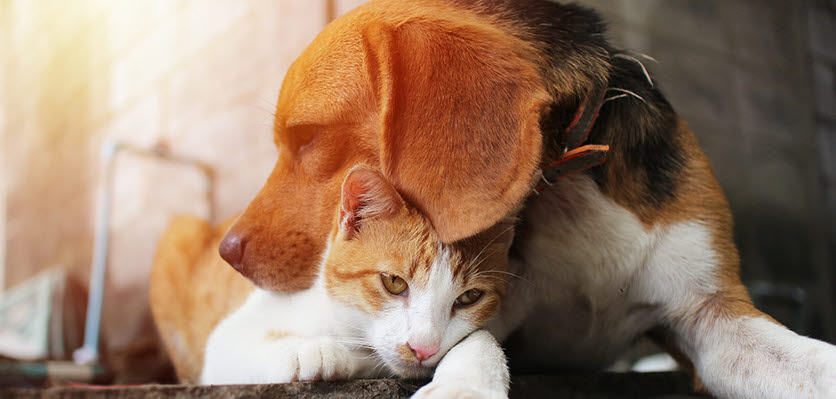
Pancreatitis means inflammation of the pancreas. The pancreas is an organ responsible for digestive enzyme secretion and most importantly, the production of insulin. It is located behind the stomach and intestines. Digestive enzymes are vital to food digestion and insulin mediates metabolism and controls blood sugar levels in the body.
When the pancreas becomes inflamed, the digestive enzymes become prematurely active in the pancreas instead of the small intestine, where they usually would become active. This causes extreme pain and swelling within the pancreas as it begins to digest itself.
Pancreatic cancer is rare in dogs and very rare in cats. Pancreatic adenocarcinomas may show similar signs to pancreatitis but signs are similarly vague and non-specific.
Adenocarinomas often have metastasized upon presentation and are seldom pursued as they are known to be unresponsive to chemotherapy and radiation thus having a poor prognosis. Pets usually succumb within weeks of the diagnosis. This particular diagnosis may occur in any dog but notably affects older female dogs and Airdale terriers.
Acute or chronic pancreatitis?
Pancreatitis may be acute or chronic in nature and may range from mild to severe. Acute means that the attack occurs suddenly, having not occurred previously. Acute onset pancreatitis should be taken very seriously as it can be life-threatening and implicate other organs in the body.
Chronic pancreatitis means that the condition has developed over time and symptoms may, therefore, be subtle or even unnoticeable to you. Repeated attacks of pancreatitis occur throughout the animals’ life and may subsequently cause longer-term damage to pancreatic tissue with each attack, impacting its function over time.
How can my pet get pancreatitis and what are the symptoms?
Dogs
The most common signs of pancreatitis in dogs are lethargy, abnormal posture or arching of the back, swollen abdomen, diarrhoea, fever, restlessness and vomiting. Owner vigilance is critical to preventing pancreatitis in dogs. This is particularly important to those that are prone to dietary indiscretions, for example, dogs that are food focussed and who are known to dig through the rubbish bin! A high-fat diet is a common and serious cause of pancreatitis in dogs. Obesity, diabetes and hypothyroidism are commonly affiliated with pancreatitis. Trauma and ingestion of insecticides or toxins may also cause a pancreatitis attack, as well as genetic predisposition.
Cats
The most common signs of pancreatitis in cats are lethargy, loss of appetite, dehydration and low body temperature. It is difficult to pick up as these symptoms can imitate many other clinical conditions or diseases.
The specific causes of pancreatitis in cats are unknown, however, aspects of cats natural defence mechanisms are thought to potentially trigger pancreatitis. Ingestion of insecticides, toxins or a fatty diet may trigger an episode of pancreatitis. Acute trauma to the pancreas, parasitic infection or infectious disorders such as toxoplasmosis, are also possible causes of pancreatitis in cats.
Treatment of pancreatitis?
If your pet exhibits signs or symptoms of pancreatitis, a veterinarian will assess your pets’ medical history and physically examine your pet. Pancreatic enzymes can be measured by way of blood tests. Radiographs and ultrasound may be used to rule out other causes.
Supportive care is commonly the treatment for pancreatitis. In severe cases, your pet may be admitted for intravenous fluid therapy, monitoring and medication to manage symptoms such as vomiting. Food may be withheld as to rest the pancreas for 24 hours. Longer-term, monitoring of fatty food intake would be critical, as your pets’ pancreas would not be able to process this fat. Low-fat diets may be recommended and smaller more frequent meal intake could be helpful.
Are there things I can do to prevent pancreatitis?
Some dog and cat breeds are known to be predisposed to pancreatitis, which may mean that your pet is more susceptible to an attack. Acute pancreatitis is known to affect miniature schnauzers, Yorkshire terriers and other terrier breeds.
Chronic pancreatitis is known to affect boxers, cavalier King Charles spaniels, English cocker spaniels and collies. Though not entirely preventable, there are things you can do to significantly reduce the risk or pancreatitis in your pet:
- Moderate your pet's diet as to ensure your pet does not become overweight
- Avoid high-fat diets
- Avoid giving your pet table scraps or human foods
- If your pet is on medications, discuss these carefully with your veterinarian as to avoid those that may be inflammatory pancreatic sensitivity
- Do not let your pet have access to the garbage!
References
- http://www.veterinaryirelandjournal.com/images/pdf/small/sa_jun_2018.pdf
- http://www.pethealthnetwork.com/dog-health/dog-diseases-conditions-a-z/acute-pancreatitis-dogs
- https://www.akc.org/expert-advice/health/pancreatitis-in-dogs/
- https://www.vet.cornell.edu/departments-centers-and-institutes/cornell-feline-health-center/health-information/feline-health-topics/feline-pancreatitis-serious
